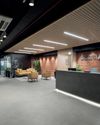The COVID-19 pandemic has engulfed the world and India is no exception. The COVID-19 virus belongs to the Corona family to which SARS and MERS also belong. As the COVID-19 virus is still not fully understood, the behavior of SARS and MERS is considered as a reference to the extent they do not contradict the present observations. The COVID-19 virus affects the respiratory track and starts with symptoms similar to the common flu. Given that the virus is a mutated strain, there is no vaccine available to fight against this contagion.
COVID-19 Transmission Routes
The size of a coronavirus particle is in the range of 80-160 nanometers. It is transferred via infected microscopic airborne particles and contaminated aerosol droplets. Droplets and small particles of a broad spectrum of diameters get generated during the course of coughing and sneezing and, to a lesser extent, even by talking and breathing. Most large cough droplets fall on nearby surfaces and objects – such as desks and tables, where they remain active for hours and even 2-3 days. The difficult part is that the infected carrier is asymptomatic in the incubation period varying from 7 to 15 days.
Small particles (less than 5 microns) released during cough stay airborne for hours and can be transported over long distances. Small droplet nuclei or residue are formed from droplets (usually within milliseconds) in the air, which shrink in size due to the process of evaporation and desiccation in low humidity.
It is known that most of the infectious particles ranging from 0.65 to 3.3μm in the cough-generated aerosols were immediately respirable. There is also no reported data or studies to rule out the possibility of the airborne-particle route. One indication for this: Coronavirus SARS-CoV-2 has been isolated from swabs taken from exhaust vents in rooms occupied by infected patients.
This story is from the May 2020 edition of Commercial Design.
Start your 7-day Magzter GOLD free trial to access thousands of curated premium stories, and 9,000+ magazines and newspapers.
Already a subscriber ? Sign In
This story is from the May 2020 edition of Commercial Design.
Start your 7-day Magzter GOLD free trial to access thousands of curated premium stories, and 9,000+ magazines and newspapers.
Already a subscriber? Sign In

WORKING TOGETHER
Professor Louise Valentine, Head of the Design School at Heriot-Watt University, on the importance of inclusive design in the workplace

WHERE CREATIVITY WORKS
Alhad Gore of Beyond Design Architects & Consultants brings his architectural expertise to life in the new office for Atul Patel Architects, blending functionality with creative flair to craft a workspace that inspires innovation and collaboration

FACILITATE INTELLIGENCE
How AI is redefining the future of facility management

DESIGNING A BETTER FUTURE
How inclusive office designs are shaping the modern workspace

ADDED VALUE
Is a good project manager the secret to success for a complex commercial design project?

RECOGNISING EXCELLENCE ACROSS THE SPECTRUM
The Grand Jury Meet of the third edition of Commercial Design Awards, a cornerstone event in India’s commercial design landscape, unfolded amidst the awe-inspiring expanse of the Welspun Global Carpet Plant in Hyderabad.

A VISION FOR 'TOTAL BUSINESS ECOSYSTEMS'
Jitu Virwani, Chairman and Managing Director of Embassy Group, redefines India's commercial real estate landscape by pioneering integrated, future-ready, and sustainable business ecosystems.

AWFIS TO DESIGN, MANAGE 165K SQ FT OFFICE SPACE FOR NSE IN MUMBAI
Awfis Space Solutions Limited on Tuesday said it will design and manage 1.65 lakh square feet of office space in Mumbai for the National Stock Exchange.

MACROTECH ACQUIRES 2.8 ACRES IN HINJEWADI
Realty developer Lodha, listed as Macrotech Developers, has acquired a 2.8acre plot of land in Pune's Hinjewadi area from Paranjape Schemes.

EMBASSY OFFICE PARKS REIT APPOINTS RITWIK BHATTACHARJEE AS INTERIM CEO
Embassy Office Parks REIT on Thursday appointed Ritwik Bhattacharjee as its interim Chief Executive Officer (CEO) with immediate effect, following Sebi’s order to suspend its CEO Arvind Maiya.